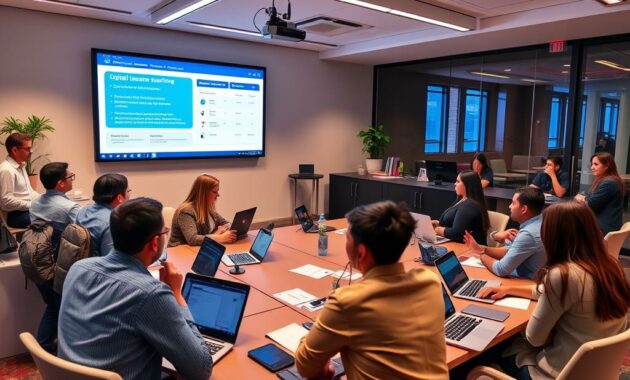In today’s fast-paced business environment, optimizing your financial strategy is crucial for success. With NetSuite Lease Accounting Software, you can streamline the management of lease-related expenses. This ensures compliance with accounting standards while also enhancing decision-making capabilities. This comprehensive tool not only gives you a clear overview of your lease obligations but also automates financial processes that are essential for maximizing ROI.
Implementing this software can lead to long-term benefits that align with your corporate financial goals. By leveraging the power of NetSuite Lease Accounting Software, you can improve your overall financial strategy. This drives significant growth for your business.
Understanding NetSuite Lease Accounting
The complexities of lease accounting are paramount for businesses seeking to enhance their financial well-being. Lease accounting entails the meticulous documentation, categorization, and disclosure of lease transactions within financial statements. This process is of utmost significance due to the advent of regulations such as ASC 842 and IFRS 16. These standards mandate the explicit recognition of lease liabilities and assets on a company’s balance sheets.
What is Lease Accounting?
Lease accounting encapsulates the management and reporting of leasing activities within a business framework. Mastery over lease accounting is essential for adherence to regulatory mandates. By accurately recording lease agreements, corporations can provide a truthful reflection of their financial standing, thereby enhancing transparency in financial reporting.
Why it Matters for Your Business
The significance of lease accounting is profound. It serves as a bulwark against the risks associated with non-compliance, which can result in substantial penalties and erode business reputation. A comprehensive understanding of lease accounting is imperative for the formulation of effective leasing strategies that align with a company’s financial structure. Leveraging tools such as NetSuite lease accounting facilitates this endeavor, ensuring compliance while optimizing asset management and reporting practices.
Key Features of NetSuite Lease Accounting
NetSuite Lease Accounting presents a suite of pivotal attributes, significantly augmenting the lease administration process. It excels in automated compliance, customizable reporting, and a user-centric interface. These features collectively empower you to manage lease obligations with ease, ensuring adherence to prevailing accounting standards.
Automated Compliance
The netsuite lease accounting features prominently include automated compliance. This capability streamlines the verification of lease agreements against current standards, obviating the necessity for manual verification. It diminishes the likelihood of human-induced inaccuracies, thereby ensuring the precision and conformity of your financial records.
Customizable Reporting
The customizable reporting functionalities within NetSuite empower the creation of bespoke financial reports, tailored to your distinct requirements. These tools are adept at furnishing insights into lease-related expenditures and asset management, facilitating data-driven decision-making processes.
User-Friendly Interface
NetSuite Lease Accounting is distinguished by its user-centric design, ensuring an interface that is accessible to all. This approach enables users of diverse technical proficiency to interact with the system seamlessly. It facilitates rapid access to necessary functionalities, thereby optimizing operational efficiency within your organization.
| Feature | Description | Benefits |
|---|---|---|
| Automated Compliance | Ensures all leases adhere to accounting standards without manual input. | Reduces errors and provides peace of mind. |
| Customizable Reporting | Generates tailored financial reports based on user specifications. | Offers insights necessary for informed decision-making. |
| User-Friendly Interface | Easy navigation for users with different levels of expertise. | Streamlines operations and enhances user experience. |
Benefits of Using NetSuite for Lease Accounting
Adopting NetSuite for lease accounting offers substantial benefits for your enterprise. This software not only simplifies financial commitments but also significantly boosts operational performance. Grasping the specific advantages can facilitate more strategic decision-making for your business.
Improved Financial Transparency
Enhanced financial transparency is a primary advantage of using NetSuite for lease accounting. It provides clear visibility into lease obligations, enhancing stakeholder confidence and ensuring adherence to regulatory standards. This clarity enables the generation of precise financial reports, reflecting your organization’s true financial standing, thereby supporting informed decision-making.
Enhanced Efficiency
Efficiency in accounting is paramount for contemporary businesses. NetSuite automates numerous manual processes, thereby reducing the time and effort your team invests in accounting tasks. This automation allows employees to concentrate on strategic initiatives that propel growth, enhancing operational agility.
Cost Savings
Adopting NetSuite can yield significant cost savings for your organization. It minimizes labor hours and compliance risks, thereby enhancing financial health. These savings contribute to operational efficiency, enabling reinvestment in other critical business areas.

| Benefit | Description | Impact on Business |
|---|---|---|
| Financial Transparency | Clear visibility into lease obligations | Builds stakeholder trust |
| Efficiency | Automation of manual tasks | Increases focus on strategic initiatives |
| Cost Savings | Reduced labor and compliance costs | Improves overall financial health |
Preparing for Implementation
Initiating your netsuite lease accounting implementation necessitates a meticulous preparation phase. A structured methodology ensures the software’s optimal functionality, thereby maximizing your organization’s utilization of its capabilities.
Assess Your Current Processes
An exhaustive evaluation of your lease accounting processes is imperative. This step uncovers inefficiencies and areas ripe for enhancement. It encompasses the methodologies employed in lease tracking and financial reporting. Such an assessment lays the groundwork for leveraging NetSuite’s functionalities, thereby streamlining the transition process.
Identify Key Stakeholders
Securing the participation of the appropriate personnel is crucial for a successful implementation. It is essential to identify stakeholders such as finance teams, IT departments, and lease management units. Their involvement in the preparation phase enhances communication and ensures resource allocation is optimized. Early collaboration among these groups fosters a conducive environment, facilitating a seamless transition to the new system.
| Stakeholder Group | Role in Implementation |
|---|---|
| Finance Team | Ensures compliance and oversees financial reporting needs |
| IT Department | Facilitates technical integration with existing systems |
| Lease Management Team | Provides insights on lease specifics and requirements |
| Management | Supports decision-making and resource allocation |
Integration with Your Existing Systems
The integration of NetSuite Lease Accounting with your existing systems is paramount for operational enhancement. This integration ensures data fluidity across platforms, thereby averting potential disruptions during the implementation phase. A meticulously planned integration facilitates the streamlining of operations, thereby elevating productivity across various departments.
Streamlining Operations
Streamlining operations necessitates the creation of a unified data environment. The integration of NetSuite Lease Accounting enables disparate departments to access requisite financial data in real-time. This real-time access significantly diminishes the time devoted to manual data entries and discrepancies, thereby enhancing the overall workflow.
Data Migration Best Practices
Adopting efficacious data migration practices is imperative when transitioning your existing data to the new system. The process entails several critical steps:
- Conducting a thorough audit of your current data to identify what necessitates migration.
- Cleaning and validating data to ensure its accuracy and relevance.
- Implementing a phased migration strategy to mitigate risks and facilitate adjustments as deemed necessary.
By adhering to these best practices, you can substantially diminish potential issues during the integration process. This, in turn, enhances overall collaboration within your organization.
Training Your Team
The implementation of NetSuite Lease Accounting necessitates a comprehensive training regimen. A tailored onboarding strategy, adapted to the diverse needs of your team, is paramount. Interactive workshops and e-learning modules serve as effective tools for imparting in-depth knowledge of the software’s functionalities.
Onboarding Strategies
The efficacy of your onboarding methodology significantly impacts your team’s rapid assimilation into NetSuite. A meticulously crafted plan should encompass:
- Interactive Workshops: Hands-on experiences foster engagement, encouraging collaborative problem-solving and inquiry.
- E-Learning Modules: Self-directed courses offer flexibility, ensuring that each team member can learn at their own pace.
- Regular Check-Ins: Follow-up sessions are indispensable for addressing lingering queries and reinforcing the initial training.
Resources for Continuous Learning
Post-training support is crucial for sustaining your team’s proficiency. Continuous learning resources are essential for fostering an environment conducive to growth and adaptation. Consider the following:
- Online Forums: Platforms for users to exchange insights and experiences with NetSuite.
- Supplier Support: Direct access to vendor support for immediate resolution of complex challenges.
- Updated Training Materials: Ensure that all staff members have access to the latest resources and updates.

| Onboarding Method | Benefits |
|---|---|
| Interactive Workshops | Encourages collaboration and real-time problem solving. |
| E-Learning Modules | Allows for self-paced learning tailored to user schedules. |
| Regular Check-Ins | Addresses ongoing concerns and reinforces training. |
Overcoming Common Challenges
The integration of NetSuite for lease accounting into your organizational framework is not without its obstacles, particularly in the realm of change management. It is imperative to cultivate an environment conducive to this transition by articulating the advantages that the new system offers. By engaging your team in the implementation process, you foster a sense of ownership, thereby reducing the period of adjustment.
Managing Resistance to Change
The phenomenon of resistance to change is endemic in the corporate world. Employing strategies such as open forums to address concerns can alleviate apprehensions. Highlighting the benefits, such as enhanced efficiency and convenience, solidifies the rationale behind adopting a unified system. By grappling with the challenges in netsuite lease accounting head-on, you significantly enhance the transition’s smoothness.
Ensuring Data Accuracy
During this transition, maintaining data accuracy in accounting is paramount. Incorporating regular audits into your workflow is essential to identify discrepancies promptly. Implementing efficient protocols for data entry will ensure sustained accuracy and integrity in your financial reports. Through consistent monitoring and training, your financial data’s quality can be assured, thereby bolstering confidence in your new accounting system.
Measuring Success Post-Implementation
Evaluating the effectiveness of your NetSuite Lease Accounting implementation necessitates a holistic approach to measuring success netsuite lease accounting. The establishment of specific key performance indicators (KPIs) in accounting is paramount for tracking progress and identifying areas for improvement over time. These metrics profoundly influence your organization’s financial operations.
Key Performance Indicators (KPIs)
KPIs are instrumental in assessing the functionality of the lease accounting software within your company’s framework. Common metrics include:
- Reduction in lease administration time
- Improvements in reporting accuracy
- Enhancements in compliance tracking
- Decrease in manual data entry errors
Monitoring these indicators facilitates the assessment of effectiveness and delineates areas requiring further attention.
Gathering User Feedback
User feedback for improvement is indispensable both during and after the implementation process. Engaging with your team yields deeper insights into how the software fulfills their needs. Implementing regular feedback loops that involve:
- Surveys assessing user satisfaction
- Focus groups for in-depth discussions
- One-on-one interviews for personal experiences
Utilizing gathered insights fosters an environment of continuous adaptation and enhances user experience, ensuring that the lease accounting system evolves alongside organizational requirements.
Future Trends in Lease Accounting
As the horizon of lease accounting unfolds, the significance of cloud solutions becomes unmistakable. These platforms, enabling access to vital data from any location at any moment, catalyze enhanced collaboration among team members. The scalability of cloud-based accounting platforms will empower organizations to adapt and refine their processes seamlessly.
Cloud Solutions and Their Impact
The adoption of cloud solutions within lease accounting workflows promises a substantial leap in operational efficiency. Transitioning from traditional on-premises systems, you will experience enhanced flexibility in accessing financial data. This transformation not only modernizes your accounting processes but also ensures compliance with evolving financial reporting standards.
The Role of AI and Automation
The advent of AI in accounting heralds a new era for finance teams, becoming indispensable for their efficiency. AI applications delve into vast datasets, forecast market trends, and unveil crucial insights. These innovations usher in an era where automation fosters dialogue and collaboration. By embracing AI in lease accounting, your organization will be poised to swiftly navigate regulatory shifts and optimize operational workflows for sustained success.



